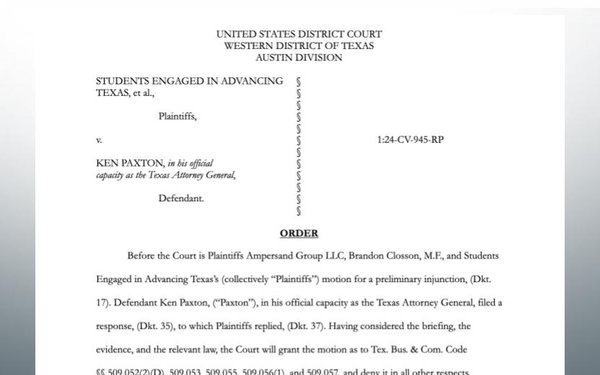
A federal judge on Friday blocked enforcement of a
Texas law that prohibited social media platforms from serving targeted ads to minors, without parental consent.
That restriction is “invalid on its face” under the First
Amendment, U.S. District Court Judge Robert Pitman in Austin said in a 37-page ruling issued Friday.
“There may exist a
compelling state interest in promoting teen mental health by limiting teens’ exposure to certain advertising, but nowhere does the court see a specific interest articulated for removing
teens’ access to targeted advertising of all kinds,” Pitman wrote.
The ruling comes in a challenge to the Securing Children Online through Parental Empowerment Act (HB 18), which partially took effect last year.
advertisement
advertisement
That law requires social platforms to ask users their ages, and then deploy filtering
technology to block "harmful" content to minors. The statute defines harmful content as including material that “promotes,” “glorifies,” or “facilitates” eating
disorders, self-harm, substance abuse, and “grooming ... or other sexual exploitation or abuse.”
The act also restricts targeted advertising to teens.
The measure was the
subject of two separate legal challenges -- one by the tech industry groups NetChoice and Computer & Communications Industry Association, and a second by a coalition including the group Students
Engaged in Advancing Texas and the Austin-based agency Ampersand Group.
The groups both argued the law violates the First Amendment prohibition on censorship by the government.
Texas
Attorney General Ken Paxton defended the measure, arguing that social platforms pose “obvious dangers” to teens.
In September Pitman partially granted the request made by NetChoice
and Computer & Communications Industry Association by blocking portions of the law that would have forced platforms to ask users their ages, and filter out “harmful” content to
minors.
At the time, he denied the groups' request to block provisions regarding targeted advertising. He said in the initial ruling that it wasn't immediately apparent to him that those
provisions are unconstitutional, but he left open the possibility of blocking those restrictions in the future.
That decision allowed Students Engaged in Advancing Texas and Ampersand Group to
pursue their request for a block on the entire law.
Those groups
initially alleged that the law could affect them in several ways, including by restricting the Ampersand Group from sending public service messages and information ads to teens about matters like
fentanyl dangers, or signs of sex trafficking.
Cameron Samuels, executive director of Students Engaged in Advancing Texas, added in a declaration submitted in December that the restriction
prevents the group “from fulfilling its mission of promoting student involvement in advocacy, legislative efforts, and education on issues of importance to youths.”
Samuels said at
the time that the group would like to use targeted ads to promote discussion of issues including advocating for the repeal of state law that restricts students' access to library books.
Pitman sided with the coalition and invalidated the restriction on ad targeting.
“The targeted advertising requirements exclusively target speech, only a small portion of which, such
as child pornography or defamation, falls outside First Amendment coverage,” he wrote.
He also noted that the ban on targeted advertising isn't narrowly tailored to the goal of
protecting minors from potentially harmful ads.
“Why, if the very use of targeted advertising toward minors creates a harm so acute as to create a compelling state interest, can a
teenager view a targeted advertisement on a sports or shopping website but not on a social platform?” he wrote.